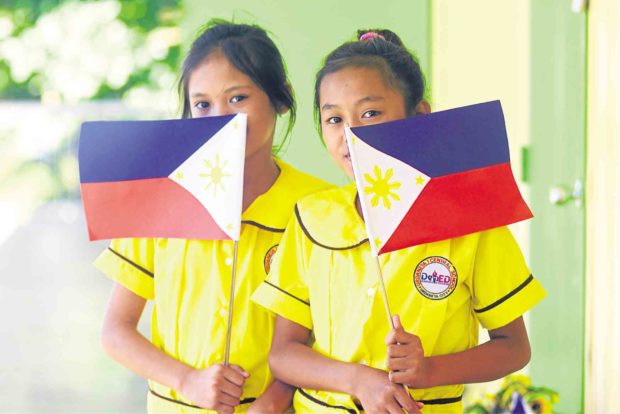DepEd exec: Discrimination of Marawi students real

LEARNING NEVER STOPS Faisania Khalid (left), 10, and her cousin, Janisah Mohammadali, 11, have transferred to the Urdaneta 1 Central Elementary School in Urdaneta City in Pangasinan province after their families fled the fighting in their home city of Marawi in Lanao del Sur province. —WILLIE LOMIBAO
LINGAYEN, PANGASINAN—While reports of discrimination of Marawi children relocated to other schools are “real,” most of these pupils are well taken care of in different schools where they have transferred, according to Ilocos regional officials of the Department of Education. (DepEd)
Education Secretary Leonor Briones has ordered a special intervention for the displaced children to make sure that they are not bullied by their classmates, said DepEd Assistant Secretary Tonisito Umali during a visit here on Thursday.
“That issue of our Marawi displaced learners being discriminated by other children is very real. But we are managing it so far,” Umali told a news briefing.
Islamic State-inspired terror groups attacked Marawi City and took over sections of the city on May 23, forcing residents to flee as fighting erupted. Government troops have been battling terrorists in Marawi for more than two months now.
Accounted for
Article continues after this advertisementOf 30,000 students from Marawi, 27,673 have been accounted for as the battle dragged on, Umali said. More than half of this number are in northern Mindanao while the biggest number has been accepted in Lanao del Norte province.
Article continues after this advertisementIt may take some time before schools in Marawi are rehabilitated so displaced students must stay in schools where they have transferred, Umali said.
To help children and teachers prepare for their return to Marawi once the fighting there stops, learners’ kits, teaching aids, desks and other school needs have been flooding the city from the different parts of the country.
Alma Ruby Torio, Ilocos region education director, said her office had sent 10,000 learners’ kits, each consisting of a school bag, notebooks, pencils, ball pens and other school supplies.
Coping with conflict
In Marawi City, around 71 children, aged 7 to 12, whose families were displaced by the fighting between government troops and terrorists, underwent this week a series of psychosocial exercises to help them cope with the impact of the conflict.
Games, art sessions, socialization and entertainment were conducted in a bid to address the stress experienced by children affected by the conflict in the city. The beneficiaries were temporarily sheltered at the Lanao del Sur capitol evacuation center.
Government soldiers facilitated some of the sessions, including the clay-designing play.
“I am happy and I want to play more with my big brothers,” said a 7-year-old boy, who was among the thousands of children affected by the violence, referring to personnel of the Joint Task Groups Ranao and Tabang who mingled and played with the children.
Language barrier
“Despite the language gap, the beneficiaries were noticed to be genuinely laughing and enjoying the series of activities and the interactions,” said Col. Tom Sedano of the Joint Task Group Tabang.
Sedano said the language barrier did not prevent Maranao children—many of whom could not speak Filipino or Bisaya—from participating in the exercises that they treated as playtime.
“Most of the instructions were done through sign language so the children would understand the mechanics of the activity. The ultimate goal was for them to enjoy and to have fun,” he said.
A United Nations agency earlier expressed concern about the well-being of some 50,000 children affected by the conflict.
“The estimated tens of thousands of children who, along with their families, have been displaced in and out of Marawi, could face severe long-term impact on their psychosocial health, their physical health as well as having their education disrupted,” said Lotta Sylwander, United Nations Children’s Fund representative to the Philippines. —REPORTS FROM GABRIEL CARDINOZA, JEOFFREY MAITEM AND RICHEL UMEL